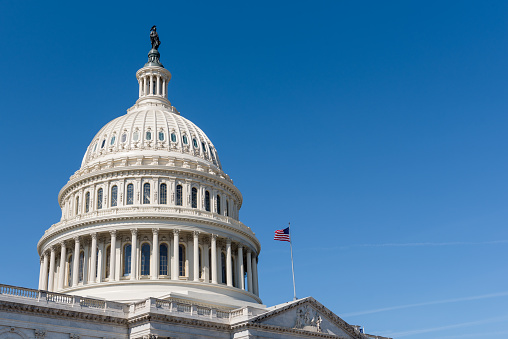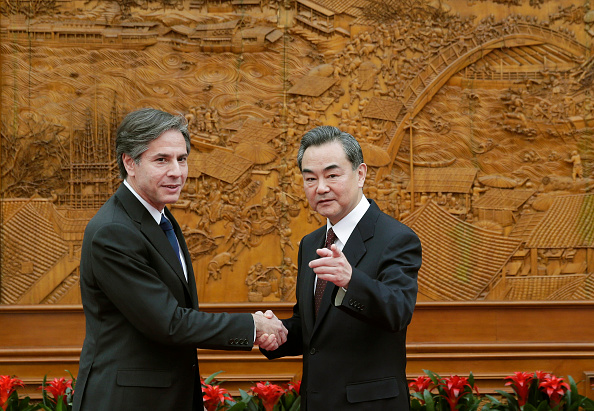
 Zero-Sum
Zero-SumThe U.S. House of Representatives debuted a bill this week designed to step up America's technological game in response to a rising China. The House's version of a comprehensive bill the Senate passed in June would boost U.S. semiconductor manufacturing and competition with China, including $52 billion to support domestic chip research and production.
The America Competes Act also includes new provisions to strengthen U.S. relations with Taiwan and the "Quad," $100 million to counter Chinese government censorship and disinformation, and calls for a closer review of outbound investments as momentum continues to build for taking a closer look at U.S.-China ties and their national security implications.
U.S. President Joe Biden issued a statement after the bill was announced, saying, "the House took an important step forward today in advancing legislation that will make our supply chains stronger and reinvigorate the innovation engine of our economy to outcompete China and the rest of the world for decades to come."
House Republicans hammered the legislation, warning that it likely won't garner a single GOP vote when it hits the House floor as soon as next week. Lawmakers will therefore need to overcome differing views in the House and Senate over how best to address competition from China and, perhaps more crucially, how to fund the nation's scientific research.
Following the Senate's passage of its legislation in June, Foreign Ministry spokesperson Wang Wenbin said China firmly rejects the bill, which is "filled with Cold War zero-sum mentality."
 Easing the Brakes
Easing the BrakesThe start of 2022 has seen simultaneous signs of a slowdown in global economic growth with the impacts of the Covid-19 Omicron variant and lingering supply chain disruptions, as well as indications of a reorientation toward tightening monetary policies in advanced economies. For China, the World Bank expects GDP growth of 5.1% this year, below the 8% estimated for 2021.
A U.S. interest rate hike is widely expected in March, but the central bank offered no clear timelines. While announcing the hikes, Chairman Jerome Powell said China's zero-Covid policy "may play into more problems in supply chains" to the extent that the government forces shutdowns of factories and ports.
And during his address at the World Economic Forum in Davos last week, Chinese President Xi Jinping issued a plea to the U.S. not to lift interest rates.
"If major economies slam on the brakes or take a U-turn in their monetary policies, there would be serious negative spillovers. They would present challenges to global economic and financial stability, and developing countries would bear the brunt of it," said Xi, according to a transcript of his remarks.
Learn more in, "Economic Tides," an interview with Larry Summers, the former U.S. Treasury Secretary and former president of Harvard University.
 Calling for Diplomacy
Calling for DiplomacyChinese Foreign Minister Wang Yi spoke on the phone to U.S. Secretary of State Antony Blinken on Thursday, addressing the China-U.S. relationship, along with both countries' involvement in the ongoing conflict between Russia and the Ukraine. As tens of thousands of Russian troops have been stationed at the Russia-Ukraine border, the U.S. hoped to call on China to urge Russia towards diplomacy in the crisis, noting that conflict wouldn't be good for anyone, including China. The State Department said that Blinken emphasized the economic and security risks should Russia act in aggression. But Wang Yi stressed that Russia's security concerns should be "taken seriously," and noted that Beijing doesn't support "external interference" in how other countries are governed.
In response, the U.S. and NATO member states are providing military reinforcement to Ukraine and are conducting "intense diplomacy" with Russian President Vladimir Putin.
Wang and Blinken also discussed what is needed for a healthy China-U.S. relationship, agreeing that neither desires a new "Cold War." Wang highlighted the need for mutual respect, peaceful coexistence, and win-win cooperation, referencing President Xi Jinping's proposal during the video meeting with President Joe Biden last November.
Read more in "Can U.S. Ease Russia's Security Concerns?," by Wu Zhenglong, a Senior Research Fellow at the China Foundation for International Studies.
Prepared by China-US Focus editorial teams in Hong Kong and New York, this weekly newsletter offers you snap shots of latest trends and developments emerging from China every week, while adding a dose of historical perspective.
- 2022-01-21 An Uncertain Future
- 2022-01-14 Digital Advances
- 2022-01-07 The Dawn of a New Political Year
- 2021-12-17 Clamp Down
- 2021-12-10 Debating Democracy
- 2021-12-03 Managing Competition
- 2021-11-19 Responsible World Leadership
- 2021-11-12 A Historic Transformation
- 2021-11-05 A Green Rivalry
- 2021-10-29 Dry Tinder
- 2021-10-22 A Diplomatic Burn
- 2021-10-15 Energy Crunch
- 2021-10-08 Stoking Tensions
- 2021-10-01 Great Power Coopetition
- 2021-09-24 Sign of Goodwill?
- 2021-09-17 State of Play
- 2021-09-10 The Last Word
- 2021-09-03 Heightened Frustrations